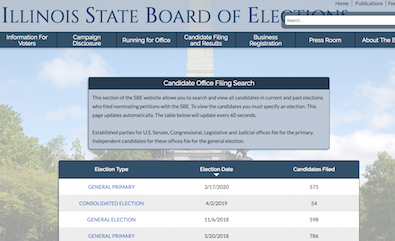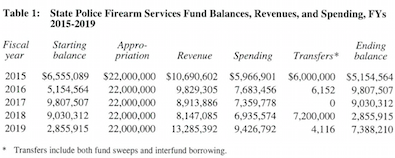* Kent Gray’s congressional campaign Facebook page yesterday…
Well…some bad news from the congressional campaign trail. I think my “frontrunner” designation by Politico came to a rapid halt today. Two objections were filed which will likely bounce me from the Illinois ballot.
Like much of my political involvement over the years, there is an interesting back story. Because so many of my FB friends are politically active around the country in different states, I thought I’d share what happened.
In Illinois, to get on the ballot you have to collect signatures of qualified voters on paper petitions. All of those petitions are notarized and bound together in “book form” and filed with the State Board of Elections. If you don’t have enough valid signatures, or there are other flaws in your paperwork, an objector can file to remove you from the ballot. This afternoon was the deadline to file objections.
Although I got started pretty late in this race, I was in decent shape (I thought) on signature collection. That was until my team that had collected the largest number of signatures failed to show up the weekend before filing. Somehow, the young man who had hundreds of signatures in his possession became unreachable for almost a week. He has claimed his phone “broke”.
The good news is that I hadn’t paid for all of those signatures yet. The bad news for me is that I had paid some of the bill…but that makes it bad news for the young man and anyone who worked with him to defraud me. Or put him up to it.
So, stay tuned to see if this was a setup. Hopefully, I’ll get to the bottom of who violated the law to abscond with the petitions. If it’s who I think it was, there will be some fascinating legal twists and turns. Once political dirty tricks cross a certain legal line, they can have serious civil and criminal exposure.
Never a dull moment in Illinois politics!
Thanks for all your support and well wishes the past two months.
He only filed about 83 pages of signatures, at max 10 per page (several were incomplete). He needed 1,373 valid signatures to qualify for the ballot.
35 Comments  
|
Tuesday Topinka blogging
Tuesday, Dec 10, 2019 - Posted by Rich Miller
* Back in the day, I used to run a weekly feature on this little website called “Friday Topinka Blogging.” It was basically just a silly photo of Judy Baar Topinka designed to poke the online trolls who hated her so much.
I was thinking about how much fun those posts were because today is the fifth anniversary of JBT’s death. So, I went looking for some other pics.
She was an animal lover…

Unafraid to show affection…

Gregarious…

Did not suffer fools…

Mischievous…

And had a great smile…

RIP JBT.
…Adding… From a 2013 marriage equality rally…

42 Comments  
|
Question of the day: Golden Horseshoe Awards
Tuesday, Dec 10, 2019 - Posted by Rich Miller
* Text from a Democratic pal regarding the Golden Horseshoe awards…
Honestly, that entire Issues staff deserves a Horseshoe  They’ve pulled together when the whole world was shooting at the Speaker (and indirectly each of them); pulled off record number of wins; and worked together to change their internal environment. They’re holding each other accountable and changing their environment from within to make it more professional and more welcoming. Those staffers are so hard working and collectively don’t get the credit they deserve. They’ve pulled together when the whole world was shooting at the Speaker (and indirectly each of them); pulled off record number of wins; and worked together to change their internal environment. They’re holding each other accountable and changing their environment from within to make it more professional and more welcoming. Those staffers are so hard working and collectively don’t get the credit they deserve.
Somebody’s gotta win, though, and the 2019 Golden Horseshoe Award for Best Illinois House Democratic Campaign Staffer goes to our 2018 winner, Tiffany Moy…
She’s smart, chill, and endlessly capable.
We met on a campaign that was challenging for a number of reasons, and we didn’t always see things eye to eye. But she never took her eyes off the prize, and we could not have won without her.
Since then, she has been a consummate professional. She never drops the ball, she never loses her temper, she never complains — I can’t imagine a better colleague and fellow soldier.
She makes me look forward to the next race.
* The 2019 Golden Horseshoe Award for Best Illinois House Republican Campaign Staffer goes to Matt Eddy…
It is surprising what he has done with and for Reps. Bryant, Severin, and Windhorst. He is on House communications staff staff, but spends his FREE TIME OFF PAYROLL, constantly planning for the next campaign. Basically he is all over southern Illinois, would hate to see his gasoline bills. Does all this and has two small children and he is active in their lives too. His wife must be a real jewel to let him put so much time in for the cause.
Several of you nominated Jayme Odom and she is indeed awesome, so she deserves honorable mention.
* Today’s categories…
* Best campaign staffer - Illinois Senate Democrats
* Best campaign staffer - Illinois Senate Republicans
Remember to explain your votes or they will not count. Also, do your very best to nominate in both categories. Thanks and have fun!
10 Comments  
|
* I wanted to do a bit of research for a story I’m working on this afternoon, so I clicked on the bookmark and surfed to the main candidate filing page on the Illinois State Board of Elections’ website. Alas, the dreaded “overlay” appeared. If you’ve ever had to deal with that website you know what I’m talking about. Here’s what the page is supposed to look like…

But here’s what you see when the overlay mysteriously deploys itself…

* You cannot make this overlay go away. You can click on the page or try to scroll down, but the overlay prevails. It has to disappear on its own, or you accidentally click on another link and then have to start all over again.
Here’s what the page says in the bottom left-hand corner while the overlay is visible…

I decided to wait it out today and activated a timer. After two minutes and ten seconds I accidentally clicked another link while trying to make the overlay go away and my experiment ended.
This doesn’t happen every time, but it happens often enough that it DRIVES ME NUTS.
/rant
26 Comments  
|
* Press release…
The Illinois Coal Basin, one of the most important coal‑producing regions in the U.S., will likely see declining production and mine closures as the industry continues to contract in the wake of coal-fired power plant retirements and falling exports, concludes a report published today by the Institute for Energy Economics and Financial Analysis.
The report, Dim Future for Illinois Basin Coal, details how coal companies in Illinois, Indiana, and Kentucky, which are already facing challenging prospects, will most likely fade away over the next two decades. A significant number of the coal-fired power plants supplied by the three‑state Basin are already scheduled to be shut down by utilities while others are being run less and less often, trends that will likely continue.
“From the beginning of 2019 through 2024, at least 15 American plants that buy Illinois Basin coal—in Alabama, Florida, Georgia, Indiana, Kentucky, North Carolina and Tennessee—will be fully or partially retired,” said Seth Feaster, an IEEFA data analyst and lead author of the report. “That number, which reflects formal announcements by utilities, is likely to grow as the economics of coal-fired generation continue to deteriorate relative to renewables and gas.”
“Meanwhile, demand for Illinois Basin coal is shrinking in key overseas markets too, a trend driven by market forces similar to those at work in the U.S.: foreign competition, and increasingly attractive forms of alternative power generation,” Feaster said.
The report offers a company-by-company overview of the Illinois Basin coal industry, noting the coal-mining companies that stand to be affected include (in order of production level): Alliance Resource Partners, Murray Energy and its partner Foresight Energy, Peabody Energy, Hallador, Arch Coal and White Stallion.
IEEFA also notes that the rising number of mine idlings or closures in the past year or so by Alliance, Foresight/Murray, and Peabody may be insufficient to match falling demand from power plants or declines in exports in the wake of recent diminishing international market prices.
Report conclusions:
* The Illinois Basin’s customer base in the U.S. continues to shrink as utilities move toward other forms of generation.
* Export-market demand is trending downwards and will continue to do so because the same policy and market forces at work in the U.S. are also transforming power-generation business models in other countries and regions.
* More Illinois Basin mines will close in the months and years ahead as the coal industry continues its structural and permanent decline.
* Communities and areas that prepare for and are proactive in embracing the energy transition will fare best.
The report urges policymakers in Illinois, Indiana and Kentucky to prepare for impacts on industry workers and local households, community tax bases, businesses and the regional economy as a whole, as well as provide leadership and sound policy initiatives to take advantage of the changes that are taking place in the energy industry.
* From the full report…
Twenty years from now, most of the Illinois Basin coal industry will be gone. Currently one of the major U.S. producing regions of thermal coal for domestic and foreign electricity generation, by 2040 it will have largely faded away as utilities shift to cleaner, cheaper generation resources.
19 Comments  
|
* Rep. Keith Wheeler (R-Oswego) asked the Legislative Research Unit, which is now part of the Commission on Government Forecasting and Accountability, to look into how much was swept or transferred out of any state funds which pay for the FOID card program, background checks for gun-related purposes and concealed carry licensing.
LRU produced this chart on spending from the State Police Firearm Services Fund. Click the pic for a better view…

Man, that’s a lot of money being left on or swiped from the table that could be used to better administer those programs.
* From Illinois State Rifle Association lobbyist Ed Sullivan’s analysis…
1.) The State Police have consistently not used all the money available in the Firearm Services Fund over the five years covered in this report. On average the State Police have not used $2,698,753 per year for the identified purposed in this report: administration of the FOID Program, background checks for firearm-related services, and conceal-carry licensing.
a. Revenue – Spending = unused funds (averaged for the 5 years)
2.) The average ending balance of the Firearm Services Fund over the five years covered in this report is $6,847302. This number includes five years of fund sweeps totaling $13,210,268. If the fund sweeps are added back into the total ending balance for the five years covered in the report, the Firearm Services Fund would have an average ending balance of $9,489,355.
3.) The State Police Services Fund receives $1 of every FOID Card fee. This fund is used to administer the Firearm Transfer Inquiry Program (FTIP). The five years that this report covers there has been $15,296,510 swept from this fund.
4.) Total fund sweeps/transfers into the General Fund of $13,210,268 from the State Police Firearm Services Fund and $15,296,510 from the State Police Services Fund over the five years covered in this report total $28,506, 778.
5.) When the conceal Carry act was being written, the sponsors of the bill purposefully made the fee $150 so the State Police had enough money to run the FOID System and the CCW System. Former Gov. Quinn was starving the FOID system and FOID card turnaround was pushing six months or more. The intent of the high CCW fee was to make the systems self-reliant.
a. By not using the fees generated by FOID and CCW the State Police opened themselves up to the General Assembly sweeping the perceived excess funds.
6.) According to this report, the FY2018 BIMP, which authorized interfund borrowing and fund sweeps, required that money be transferred back to a fund from which it had been swept or borrowed if that fund has “insufficient cash” to support appropriated spending.
a. The State Police did not declare insufficient cash to maintain the mission of the Firearm Services Fund or the State Police Services Fund otherwise the fund sweeps of $13,210,268 and $15,296,510 would have been paid back.
b. P.A. 100-23 (2017), adding 30ILCS 105/5h.5(b) and 30 ILCS 105/8.52(b)
7.) If the FOID card fee was increased by $10, and all the revenue generated went to the Firearm Services Fund, the fees generated would equal approximately $2,300,000 a year for ten years. Put another way, the State Police are not spending fees presently collected that would equal a $10 increase in the FOID fees per year. These statistics do not include average ending balances that have not been spent or average ending balances with Fund Sweeps not spent.
* ISRA press release…
“Five years of fund sweeps is unacceptable and needs to be addressed immediately. Beyond the delays and problems in the FOID and ICCL program, these fund sweeps are hampering citizens from exercising their Constitutional Right. Our office gets daily calls from people who are having difficulties navigating the FOID card process so it’s no wonder we see these problems, given a significant portion of the money intended to fund the program has been raided for other state programs,” [Richard Pearson, Executive Director of the Illinois State Rifle Association] said.
Efforts by anti-gun groups to push legislation that would more than double the FOID card fee was a call to action for ISRA to get unbiased data on how the FOID and Concealed Carry programs have been managed and how they are funded. The anti-gunners insisted the program was underfunded and therefore the FOID fee must be raised. The experienced ISRA lobby team worked with Rep. Wheeler (R-Oswego) to have the Legislative Research Unit produce an unbiased accounting of the revenues generated by the FOID card and ICCL fees.
“We pursued this investigation because we wanted honest gun owners to know the truth about what was happening to the fees that they pay for the right to own a firearm in Illinois,” Pearson said. “We worked with Rep. Wheeler to secure a report from the Legislative Research Unit on what was happening to the user fees and now we know. There is no shortage – just money being taken from these accounts to be used for other things.”
36 Comments  
|
* I forgot about this anniversary while blogging yesterday, but tweeted it out last night…
* Let’s go back to Dan Vock’s interview of Senate President John Cullerton…
Blagojevich swore Cullerton in as Senate president on Jan. 14, 2009, and, almost immediately, the Senate began preparing for the governor’s impeachment trial. Even though Blagojevich was a Democrat, he could count on little support from his fellow Democrats in the legislature during the impeachment. The House approved charges against him on a 117-1 vote, with the only dissent coming from Blagojevich’s sister-in-law. Two weeks later, the Senate voted unanimously to remove Blagojevich from office. Cullerton called it a “shameful low” in Illinois’ history.
“I personally voted to remove Mr. Blagojevich, the former governor, from office today for three reasons,” Cullerton said after the vote. “He has demonstrated a clear inability to govern. He has shown disdain for the laws and the processes of the state. And he has deliberately and pathologically abused his power without regard for the people he was elected to serve.”
Cullerton now says the impeachment trial also set a tone of bipartisan cooperation in the chamber. Both he and Radogno, the Senate Republican leader, had just assumed the top spots in their caucuses when the trial began. Illinois had not had an impeachment trial since the days of Abraham Lincoln, so the staffs had to work together to develop the procedures for how to handle the governor’s trial. […]
But it also helped that both caucus leaders were new, Radogno says. “There had been a bitter, unproductive relationship between previous leaders,” she says. “We said, point blank, we’re not going to perpetuate that kind of dysfunction. It’s not good for the institution… We did try to conduct matters in a way that was obviously partisan, but at least respectful.”
Discuss.
8 Comments  
|
New laws
Tuesday, Dec 10, 2019 - Posted by Rich Miller
* Excerpt of HB92’s synopsis, which was signed into law in July and takes effect next June…
Provides that whenever a peace officer is aware of a warrant of arrest issued by a circuit court of the State for a person and the peace officer has contact with the person because the person is requesting or receiving emergency medical assistance or medical forensic services for sexual assault at a medical facility, if the warrant of arrest is not for a forcible felony, a violent crime, or an alleged violation of parole or mandatory supervised release, the peace officer shall contact the prosecuting authority of the jurisdiction issuing the warrant, or if that prosecutor is not available, the prosecuting authority for the jurisdiction that covers the medical facility to request waiver of the prompt execution of the warrant. Provides that the prosecuting authority may secure a court order waiving the immediate execution of the warrant and provide a copy to the peace officer.
* The Tribune has a story about the new law…
One woman was pinned to the emergency room floor by officers after her rape kit was done. Another woman was handcuffed to her hospital bed before the exam could begin. Both were sexual assault survivors who went to an Illinois emergency room seeking help. Both were arrested instead.
Police officers who respond to emergency room calls can and do jail sexual assault survivors who have warrants out for their arrest, even after offenses like unpaid parking tickets, shoplifting or failure to appear in court.
“This doesn’t seem fair, nor the right time,” said Sarah Layden, director of programs and public policy at survivor support nonprofit Resilience. […]
In one case report by ICASA, a woman went to an emergency room for a rape exam and medication to prevent exposure to HIV. Instead, police officers found a drug-related warrant and arrested her as she wept. “Once the officers placed her under arrest, she changed her mind about everything,” her advocate told ICASA. “She was crying and saying that she should have never come to the hospital.”
* Greg Bishop has a large roundup of new laws, but here’s an excerpt…
In Illinois, more than 250 new laws take effect Jan. 1 that will affect parents, employers, drivers, students and those in the criminal justice system.
For parents, one new law allows minors 12 and older to get preventative STD treatments such as HIV PrEP medications without parental consent. ID cards for minors will cost $5, not $10. If your child is a paid performer, a new law requires at least 15 percent of gross earnings be deposited into a trust fund they can access when they turn 18.
If you’re out and need to use a baby changing table, one new state law requires every public building with public restrooms to have at least one safe, sanitary, convenient and publicly accessible baby diaper changing station accessible to women. Also, any single-occupancy bathrooms in public must have a sign that notes “restroom” and not any specific gender.
If you have cats, you’ll have to get rabies inoculations.
22 Comments  
|
* Brenden Moore at the SJ-R on the renovations of and other upgrades to the governor’s mansion…
The mansion, which had fallen into disrepair after years of deferred maintenance and neglect, reopened to the public in July 2018 after a $15 million renovation, which was led by former first lady Diana Rauner.
M.K. Pritzker said she was grateful to Rauner for doing “an amazing job renovating the Governor’s Mansion.” […]
To get the mansion ready for the holiday season, Mrs. Pritzker worked with the Illinois Department of Corrections to give women inmates the opportunity to put their skills to use. This included helping assemble floral arrangements displayed in vases around the mansion and the gingerbread village.
“What they’ve produced here is as good as anywhere I’ve seen in the United States and all of the women that helped should be very proud of their work and so should their families,” Mrs. Pritzker said. “I think it’s just incredible and I’m just so very proud of them.”
40 Comments  
|
* The beginning and end of Rep. Kelly Cassidy’s op-ed as it appeared in the Tribune yesterday…
Kristen McQueary’s recent column (“The fall and rise of former state Rep. John Anthony,” Nov. 26), in which she declares former state Rep. John Anthony’s redemption from his #MeToo moment, denies the reality of his victims and raises important questions: Why is there such a disproportionate concern for the lives and well-being of perpetrators of abuse — and why do victims never seem to receive the same? […]
McQueary minimizes the story of what led to Anthony’s downfall while fawning over his rise from the ashes. The editorial page regularly uses Hampton’s name as a cudgel against House Speaker Michael Madigan. But these writers don’t care whether Hampton’s abuser, Kevin Quinn, repents. They don’t care about Anthony’s victims, and they have no expectation that he does the work to earn redemption. They care about ideology and they’re willing to exploit anyone’s pain they can to promote it.
The paper asked Cassidy to limit her submission to 400 words, so she rewrote it.
* Here is her op-ed as originally submitted…
Kristen McQueary’s love letter to former Representative Anthony, in which she declares his redemption from his #MeToo moment, reaches a new low in tone deafness. What is our obsession with what comes next in the lives of perpetrators of abuse like Anthony? Why is there such a disproportionate concern for their lives and wellbeing–and why do victims never seem to receive the same?
Time and again, we are subjected to questions of what constitutes an appropriate punishment for men caught up in public cases of abusing women in the workplace. The pearl clutching concerns over so called “cancel culture” have grown incredibly tiresome. When will we start talking about what the appropriate remedies are for the women subjected to this abuse? We should be focusing our energy on contemplating the long term trauma that can result from being abused within a power dynamic as complex as a political workplace.
And yes, let’s also have the conversation about what redemption looks like. I am certain there are men among my colleagues who look back and cringe at some of their past actions and wonder what they can do to make it right, and men caught up in cases who truly want to repair the harm they’ve done. But redemption is not a right or guarantee–one must do the work to earn forgiveness, to recognize the harm they’ve caused and to commit to working to repair it. As I tweeted the night the article posted, the bare minimum looks a little like this: 1) acknowledge the harm done and accept consequences, 2) seek guidance on changing your behavior and do the work, 3) NEVER DO IT AGAIN, and 4) help others learn how not to repeat your mistakes.
McQueary proclaims Anthony redeemed–because she says so. Did she call any of the victims? Did she ask Anthony whether he had apologized to any of them? Whether he had pursued therapy to address the underlying behavior behind the “mistakes” he says he has made? Did she ask the victims how they felt about whether he was deserving of redemption? If she did, none of that information made it into her column.
The women who have come forward about sexual misconduct they’ve endured are expected to just go back to their everyday work lives, frequently still in close proximity to abusers, without a system in place to address the damage done. As high profile sexual harassment victim Alaina Hampton has shared, even notes from therapy to address the harms done can be subpoenaed if the victim is seeking damages for emotional distress and mental health trauma, creating a chilling disincentive to getting help. Tie that with the effect of feeling shunned at work lest others be seen as a whistleblower too, and we have a perfect storm of challenges facing folks who come forward to bring an end to the abuse.
Every time I see a story mentioning one of the higher profile #MeToo stories in the press, my first thought is to check in on the victim in the story. Because, make no mistake, even when someone has no regrets about coming forward, new mentions bring new traumas.
McQueary goes to great lengths to minimize the story of what led to former Rep. Anthony’s downfall while fawning over his rise from the ashes. The women in that story had to see their stories belittled, minimized and disregarded in order to praise the man who changed their work experience forever.
For this to come from an editorial page that uses Alaina Hampton’s name every chance they get as a cudgel against Speaker Madigan and his allies is repulsive. These writers don’t care what happened to Alaina and they don’t care whether Kevin Quinn repents and finds a new life. They don’t care about the victims of former Rep. Anthony, and they clearly have no expectations that he does the work to earn redemption. They care about ideology and they’re willing to exploit anyone’s pain they can to promote it.
The phrase “a new low in tone deafness” was removed at the Tribune’s request, Cassidy said, because it “violated their standards.”
34 Comments  
|
Looking on the bright side
Tuesday, Dec 10, 2019 - Posted by Rich Miller
* We’ve talked before about how Chinese-Americans have been involved with the various local suburban cannabis opt-out pushes. Agree with the citizen activists or not, this is a fascinating development because it could lead to greater political involvement and influence down the road. From last night…
* The story…
Palatine village council members Monday night voted to allow marijuana retailers in the town. […]
Roughly 40 speakers gave their opinions on the marijuana issue to the village council. Similar to previous meetings, those in favor of allowing the pot retailers cited the potential for additional sales tax revenue.
“Palatine has an opportunity to keep sales tax dollars in its village,” said James Dittrich, a lifelong village resident and zoning board of appeals member.
Opponents reiterated concerns that weed businesses would lead to declining property values, harm children and be an improper revenue source. Resident Vicky Wilson cited several suburbs that have exercised local control by opting out and asked Palatine to do the same.
10 Comments  
|
* Greg Sargent at the Washington Post asked economist Gabriel Zucman to crunch some numbers…
The top-line finding: Among the bottom 50 percent of earners, average real annual income even after taxes and transfers has edged up a meager $8,000 since 1970, rising from just over $19,000 to just over $27,000 in 2018.
By contrast, among the top 1 percent of earners, average income even after taxes and transfers has tripled since 1970, rising by more than $800,000, from just over $300,000 to over $1 million in 2018.
Among the top 0.1 percent, average after-tax-and-transfer income has increased fivefold, from just over $1 million in 1970 to over $5 million in 2018. And among the top .01 percent, it has increased nearly sevenfold, from just over $3.5 million to over $24 million.
I’m emphasizing the phrase “after taxes and transfers” because this is at the core of Zucman’s new analysis. The idea is to show the combined impact of both the explosion of pretax income at the top and the decline in the effective tax rate paid by those same earners — in one result.
Accompanying chart…

Go read the rest.
96 Comments  
|
|
Comments Off  
|
|
 Support CapitolFax.com
Support CapitolFax.com
Visit our advertisers...
  ...............
...............
 ...............
...............
 ...............
...............
 ...............
...............
 ...............
...............
 ...............
...............
 ...............
...............
 ...............
...............


|
   
|
Hosted by MCS |
SUBSCRIBE to Capitol Fax |
Advertise Here |
Mobile Version |
Contact Rich Miller
|






























